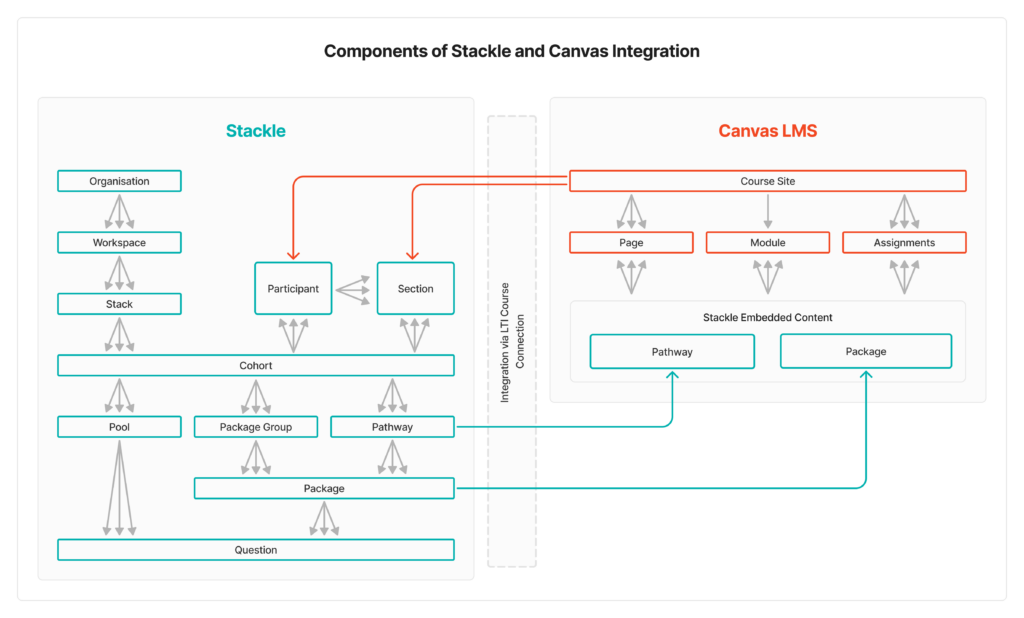Overview #
Pathways serve as a valuable tool in Stackle, providing Participants with an alternate way to access and explore Packages.
Pathways are designed to present Packages to Participants outside of the standard content flow, offering an alternate or additional means of delivering course material. They can be used to summarize content from a single Package Group or multiple groups, surfacing relevant information for easy reference. Descriptions and release schedules allow you to add context to the Package Groups, creating a gamified experience for Participants.
When enabled, Pathways can display individual progress or allow Participants to compare their progress with their peers in the current cohort. This feature helps Participants gauge their standing within the course and fosters a sense of community and engagement.
Pathways grant authors the flexibility to showcase individual Packages located throughout their content in a convenient, centralized location. With Stackle’s ability to re-package Questions in different Package Groups, you can consolidate and organize Questions in a variety of ways, creating a personalized and dynamic learning experience for your Participants.

Where do Pathways fit in Stackle? #
Pathways sit directly under a Cohort. Each Pathway may can contain one or more Packages.

How can we use Pathways? #
Pathways are an often-underappreciated feature in Stackle, but they offer a powerful way to enhance the visibility and interaction with the content that Authors create. With their potential limited only by the creativity of engaging course designs, here are some ways you can utilise Pathways:
- Progress tracker: Use Pathways to help Participants monitor their progress throughout the course, motivating them to stay engaged and complete activities on time.
- Learning reinforcement: Create Pathways that review essential concepts or skills from various Package Groups, helping Participants solidify their understanding and identify areas for improvement.
- Cross-curricular integration: Develop Pathways that link related content from different Package Groups or courses, fostering interdisciplinary connections and promoting deeper understanding.
- Skill development: Use Pathways to guide Participants through a series of Packages that target specific skill sets, offering a structured approach to mastering new abilities.
- Self-assessment: Design Pathways that allow Participants to evaluate their understanding of course material, giving them insights into their strengths and areas for growth.
- Pre- and post-assessments: Design Pathways for pre-course assessments to identify Participants’ prior knowledge and post-course assessments to evaluate their learning progress and overall course effectiveness.
- Extension activities: Develop Pathways that offer advanced or supplementary content for Participants who wish to explore topics more deeply or expand their skillsets beyond the core curriculum.
- Peer feedback and review: Design Pathways that facilitate peer review and feedback processes, allowing Participants to learn from each other and refine their work based on constructive criticism.
- Resource library: Develop a Pathway that serves as a curated collection of resources, such as articles, videos, or websites, related to the course content, giving Participants easy access to valuable supplementary materials.
By leveraging these innovative ways to use Pathways, you can create dynamic, engaging, and personalized learning experiences that elevate the value of your course content and increase participant satisfaction.
At Stackle, we continually strive to discover new and innovative ways to utilize our platform, and we greatly value input from our community. If you have come across a unique use case that isn’t listed in our resources, we encourage you to share your experience with us. By doing so, you’ll be contributing to the knowledge base of our community and helping others to expand their toolkit of effective strategies. Your insights and creativity are essential to the ongoing development and improvement of Stackle, and we look forward to learning from your experiences.